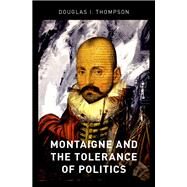Montaigne and the Tolerance of Politics
, by Thompson, Douglas I.- ISBN: 9780190679934 | 019067993X
- Cover: Hardcover
- Copyright: 1/17/2018
At the heart of Montaigne's Essais lies a political conception of religious tolerance that we have largely forgotten today. In contemporary popular and academic discourse, tolerance of religious and other differences most often appears as an individual ethical disposition or a moral principle of public law. For Montaigne, tolerance is instead a political capacity: the power and ability to negotiate relationships of basic trust and civil peace with one's opponents in political conflict. Contemporary thinkers often argue that what matters most for tolerance is how we talk to our political opponents: with respect, reasonableness, and civility. For Montaigne, what matters most is not how, but rather that we talk to each other across lines of disagreement. In his view, any effective politics of tolerance requires actors with a sufficiently high tolerance for this political activity.
Using his own experience negotiating between warring Catholic and Huguenot parties as a model, Montaigne investigates and publicly prescribes a set of skills, capacities, and dispositions that might help his readers to become the kinds of people who can initiate and sustain dialogue with the "other side" to achieve public goods - even when respect, reasonableness, and civility are not yet assured. Montaigne and the Tolerance of Politics argues that this dimension of tolerance is worth recovering and reconsidering in contemporary democratic societies, in which partisan "sorting" and multidimensional polarization has evidently rendered political leaders and ordinary citizens less and less able to talk to each other to resolve political conflicts and to cooperate on matters of common public concern.
Using his own experience negotiating between warring Catholic and Huguenot parties as a model, Montaigne investigates and publicly prescribes a set of skills, capacities, and dispositions that might help his readers to become the kinds of people who can initiate and sustain dialogue with the "other side" to achieve public goods - even when respect, reasonableness, and civility are not yet assured. Montaigne and the Tolerance of Politics argues that this dimension of tolerance is worth recovering and reconsidering in contemporary democratic societies, in which partisan "sorting" and multidimensional polarization has evidently rendered political leaders and ordinary citizens less and less able to talk to each other to resolve political conflicts and to cooperate on matters of common public concern.







